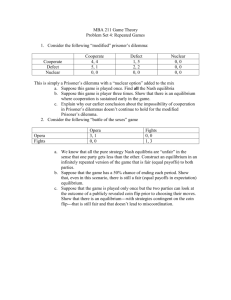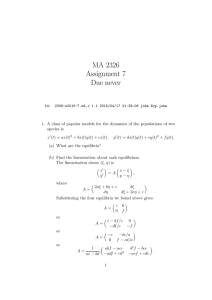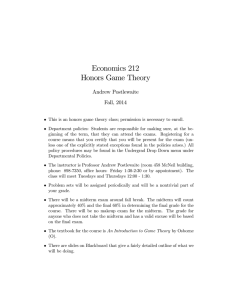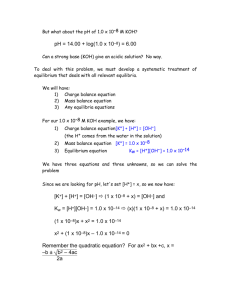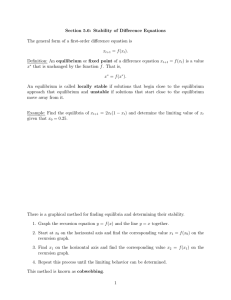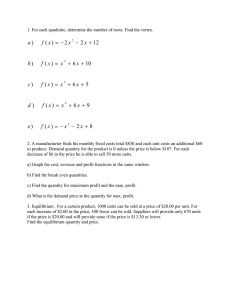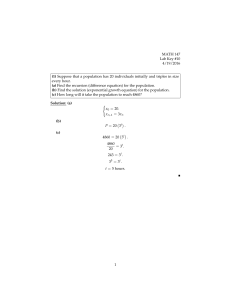1 Repeated Games and Reputations Long-Run Relationships
advertisement
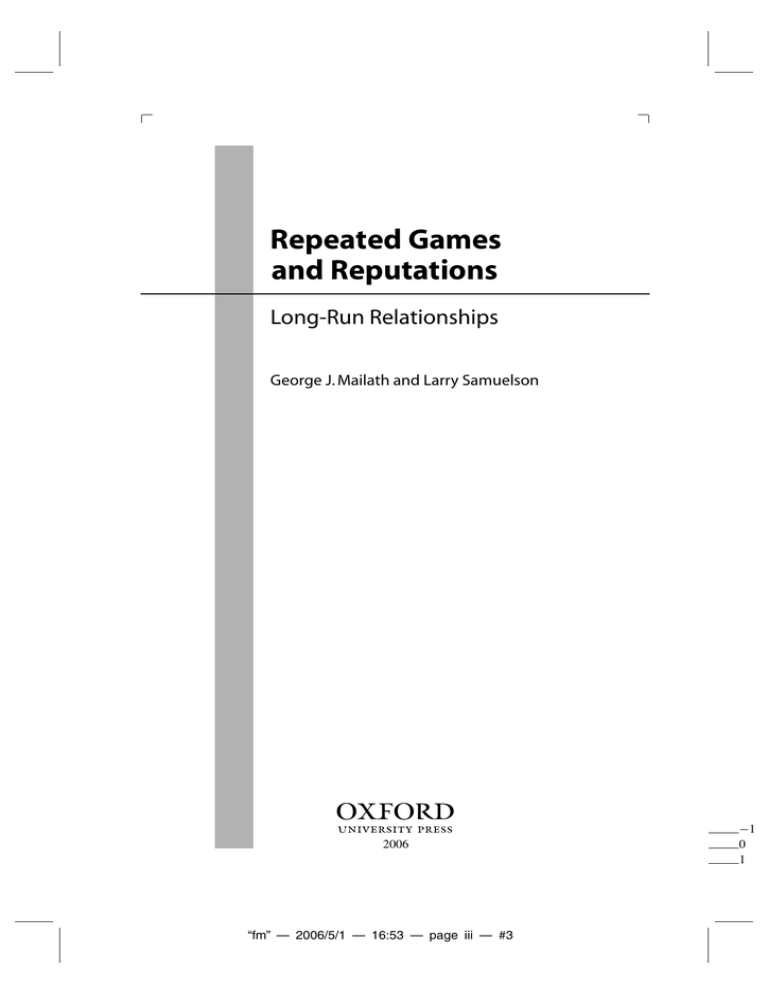
Repeated Games and Reputations Long-Run Relationships George J. Mailath and Larry Samuelson 1 2006 “fm” — 2006/5/1 — 16:53 — page iii — #3 −1 0 1 Contents 1 Introduction 1.1 Intertemporal Incentives 1.2 The Prisoners’ Dilemma 1.3 Oligopoly 1.4 The Prisoner’s Dilemma under Imperfect Monitoring 1.5 The Product-Choice Game 1.6 Discussion 1.7 A Reader’s Guide 1.8 The Scope of the Book Part I 1 1 3 4 5 7 8 10 10 Games with Perfect Monitoring 2 The Basic Structure of Repeated Games with Perfect Monitoring 2.1 2.2 2.3 2.4 2.5 2.6 2.7 The Canonical Repeated Game 2.1.1 The Stage Game 2.1.2 Public Correlation 2.1.3 The Repeated Game 2.1.4 Subgame-Perfect Equilibrium of the Repeated Game The One-Shot Deviation Principle Automaton Representations of Strategy Profiles Credible Continuation Promises Generating Equilibria 2.5.1 Constructing Equilibria: Self-Generation 2.5.2 Example: Mutual Effort 2.5.3 Example: The Folk Theorem 2.5.4 Example: Constructing Equilibria for Low δ 2.5.5 Example: Failure of Monotonicity 2.5.6 Example: Public Correlation Constructing Equilibria: Simple Strategies and Penal Codes 2.6.1 Simple Strategies and Penal Codes 2.6.2 Example: Oligopoly Long-Lived and Short-Lived Players 2.7.1 Minmax Payoffs 2.7.2 Constraints on Payoffs “fm” — 2006/5/1 — 16:53 — page ix — #9 15 15 15 17 19 22 24 29 32 37 37 40 41 44 46 49 51 51 54 61 63 66 −1 0 1 x Contents 3 The Folk Theorem with Perfect Monitoring 3.1 3.2 3.3 3.4 3.5 3.6 3.7 3.8 Examples Interpreting the Folk Theorem 3.2.1 Implications 3.2.2 Patient Players 3.2.3 Patience and Incentives 3.2.4 Observable Mixtures The Pure-Action Folk Theorem for Two Players The Folk Theorem with More than Two Players 3.4.1 A Counterexample 3.4.2 Player-Specific Punishments Non-Equivalent Utilities Long-Lived and Short-Lived Players Convexifying the Equilibrium Payoff Set Without Public Correlation Mixed-Action Individual Rationality 4 How Long Is Forever? 4.1 Is the Horizon Ever Infinite? 4.2 Uncertain Horizons 4.3 Declining Discount Factors 4.4 Finitely Repeated Games 4.5 Approximate Equilibria 4.6 Renegotiation 4.6.1 Finitely Repeated Games 4.6.2 Infinitely Repeated Games 5 Variations on the Game Random Matching 5.1.1 Public Histories 5.1.2 Personal Histories 5.2 Relationships in Context 5.2.1 A Frictionless Market 5.2.2 Future Benefits 5.2.3 Adverse Selection 5.2.4 Starting Small 5.3 Multimarket Interactions 5.4 Repeated Extensive Forms 5.4.1 Repeated Extensive-Form Games Have More Subgames 5.4.2 Player-Specific Punishments in Repeated Extensive-Form Games 5.4.3 Extensive-Form Games and Imperfect Monitoring 5.4.4 Extensive-Form Games and Weak Individual Rationality 5.4.5 Asynchronous Moves 5.4.6 Simple Strategies 5.1 “fm” — 2006/5/1 — 16:53 — page x — #10 69 70 72 72 73 75 76 76 80 80 82 87 91 96 101 105 105 106 107 112 118 120 122 134 145 145 146 147 152 153 154 155 158 161 162 163 165 167 168 169 172 −1 0 1 xi Contents Dynamic Games: Introduction 5.5.1 The Game 5.5.2 Markov Equilibrium 5.5.3 Examples 5.6 Dynamic Games: Foundations 5.6.1 Consistent Partitions 5.6.2 Coherent Consistency 5.6.3 Markov Equilibrium 5.7 Dynamic Games: Equilibrium 5.7.1 The Structure of Equilibria 5.7.2 A Folk Theorem 5.5 6 Applications Price Wars 6.1.1 Independent Price Shocks 6.1.2 Correlated Price Shocks 6.2 Time Consistency 6.2.1 The Stage Game 6.2.2 Equilibrium, Commitment, and Time Consistency 6.2.3 The Infinitely Repeated Game 6.3 Risk Sharing 6.3.1 The Economy 6.3.2 Full Insurance Allocations 6.3.3 Partial Insurance 6.3.4 Consumption Dynamics 6.3.5 Intertemporal Consumption Sensitivity 6.1 Part II 174 175 177 178 186 187 188 190 192 192 195 201 201 201 203 204 204 206 207 208 209 210 212 213 219 Games with (Imperfect) Public Monitoring 7 The Basic Structure of Repeated Games with Imperfect Public Monitoring 7.1 7.2 7.3 7.4 7.5 The Canonical Repeated Game 7.1.1 The Stage Game 7.1.2 The Repeated Game 7.1.3 Recovering a Recursive Structure: Public Strategies and Perfect Public Equilibria A Repeated Prisoners’ Dilemma Example 7.2.1 Punishments Happen 7.2.2 Forgiving Strategies 7.2.3 Strongly Symmetric Behavior Implies Inefficiency Decomposability and Self-Generation The Impact of Increased Precision The Bang-Bang Result “fm” — 2006/5/1 — 16:53 — page xi — #11 225 225 225 226 228 232 233 235 239 241 249 251 −1 0 1 xii Contents 7.6 An Example with Short-Lived Players 7.6.1 Perfect Monitoring 7.6.2 Imperfect Public Monitoring of the Long-Lived Player 7.7 The Repeated Prisoners’ Dilemma Redux 7.7.1 Symmetric Inefficiency Revisited 7.7.2 Enforcing a Mixed-Action Profile 7.8 Anonymous Players 8 Bounding Perfect Public Equilibrium Payoffs Decomposing on Half-Spaces The Inefficiency of Strongly Symmetric Equilibria Short-Lived Players 8.3.1 The Upper Bound on Payoffs 8.3.2 Binding Moral Hazard 8.4 The Prisoners’ Dilemma 8.4.1 Bounds on Efficiency: Pure Actions 8.4.2 Bounds on Efficiency: Mixed Actions 8.4.3 A Characterization with Two Signals 8.4.4 Efficiency with Three Signals 8.4.5 Efficient Asymmetry 8.1 8.2 8.3 9 The Folk Theorem with Imperfect Public Monitoring 9.1 9.2 9.3 9.4 9.5 9.6 9.7 9.8 Characterizing the Limit Set of PPE Payoffs The Rank Conditions and a Public Monitoring Folk Theorem Perfect Monitoring Characterizations 9.3.1 The Folk Theorem with Long-Lived Players 9.3.2 Long-Lived and Short-Lived Players Enforceability and Identifiability Games with a Product Structure Repeated Extensive-Form Games Games of Symmetric Incomplete Information 9.7.1 Equilibrium 9.7.2 A Folk Theorem Short Period Length 255 256 260 264 264 267 269 273 273 278 280 280 281 282 282 284 287 289 291 293 293 298 303 303 303 305 309 311 316 318 320 326 10 Private Strategies in Games with Imperfect Public Monitoring 329 10.1 Sequential Equilibrium 10.2 A Reduced-Form Example 10.2.1 Pure Strategies 10.2.2 Public Correlation 10.2.3 Mixed Public Strategies 10.2.4 Private Strategies 10.3 Two-Period Examples 10.3.1 Equilibrium Punishments Need Not Be Equilibria 10.3.2 Payoffs by Correlation 10.3.3 Inconsistent Beliefs 329 331 331 332 332 333 334 334 337 338 “fm” — 2006/5/1 — 16:53 — page xii — #12 −1 0 1 xiii Contents 10.4 An Infinitely Repeated Prisoner’s Dilemma 10.4.1 Public Transitions 10.4.2 An Infinitely Repeated Prisoners’ Dilemma: Indifference 11 Applications 11.1 Oligopoly with Imperfect Monitoring 11.1.1 The Game 11.1.2 Optimal Collusion 11.1.3 Which News Is Bad News? 11.1.4 Imperfect Collusion 11.2 Repeated Adverse Selection 11.2.1 General Structure 11.2.2 An Oligopoly with Private Costs: The Game 11.2.3 A Uniform-Price Equilibrium 11.2.4 A Stationary-Outcome Separating Equilibrium 11.2.5 Efficiency 11.2.6 Nonstationary-Outcome Equilibria 11.3 Risk Sharing 11.4 Principal-Agent Problems 11.4.1 Hidden Actions 11.4.2 Incomplete Contracts: The Stage Game 11.4.3 Incomplete Contracts: The Repeated Game 11.4.4 Risk Aversion: The Stage Game 11.4.5 Risk Aversion: Review Strategies in the Repeated Game Part III 340 340 343 347 347 347 348 350 352 354 354 355 356 357 359 360 365 370 370 371 372 374 375 Games with Private Monitoring 12 Private Monitoring 12.1 A Two-Period Example 12.1.1 Almost Public Monitoring 12.1.2 Conditionally Independent Monitoring 12.1.3 Intertemporal Incentives from Second-Period 12.2 12.3 12.4 12.5 Randomization Private Monitoring Games: Basic Structure Almost Public Monitoring: Robustness in the Infinitely Repeated Prisoner’s Dilemma 12.3.1 The Forgiving Profile 12.3.2 Grim Trigger Independent Monitoring: A Belief-Based Equilibrium for the Infinitely Repeated Prisoner’s Dilemma A Belief-Free Example 13 Almost Public Monitoring Games 13.1 When Is Monitoring Almost Public? 13.2 Nearby Games with Almost Public Monitoring “fm” — 2006/5/1 — 16:53 — page xiii — #13 385 385 387 389 392 394 397 398 400 404 410 415 415 418 −1 0 1 xiv Contents 13.2.1 Payoffs 13.2.2 Continuation Values 13.2.3 Best Responses 13.2.4 Equilibrium 13.3 Public Profiles with Bounded Recall 13.4 Failure of Coordination under Unbounded Recall 13.4.1 Examples 13.4.2 Incentives to Deviate 13.4.3 Separating Profiles 13.4.4 Rich Monitoring 13.4.5 Coordination Failure 13.5 Patient Players 13.5.1 Patient Strictness 13.5.2 Equilibria in Nearby Games 13.6 A Folk Theorem 14 Belief-Free Equilibria in Private Monitoring Games 14.1 Definition and Examples 14.1.1 Repeated Prisoners’ Dilemma with Perfect Monitoring 14.1.2 Repeated Prisoners’ Dilemma with Private Monitoring 14.2 Strong Self-Generation Part IV 418 419 421 421 423 425 425 427 428 432 434 434 435 437 441 445 445 447 451 453 Reputations 15 Reputations with Short-Lived Players 15.1 The Adverse Selection Approach to Reputations 15.2 Commitment Types 15.3 Perfect Monitoring Games 15.3.1 Building a Reputation 15.3.2 The Reputation Bound 15.3.3 An Example: Time Consistency 15.4 Imperfect Monitoring Games 15.4.1 Stackelberg Payoffs 15.4.2 The Reputation Bound 15.4.3 Small Players with Idiosyncratic Signals 15.5 Temporary Reputations 15.5.1 Asymptotic Beliefs 15.5.2 Uniformly Disappearing Reputations 15.5.3 Asymptotic Equilibrium Play 15.6 Temporary Reputations: The Proof of Proposition 15.5.1 15.6.1 Player 2’s Posterior Beliefs 15.6.2 Player 2’s Beliefs about Her Future Behavior “fm” — 2006/5/1 — 16:53 — page xiv — #14 459 459 463 466 470 474 477 478 480 484 492 493 494 496 497 500 500 502 −1 0 1 xv Contents 15.6.3 Player 1’s Beliefs about Player 2’s Future Behavior 15.6.4 Proof of Proposition 15.5.1 16 Reputations with Long-Lived Players 16.1 The Basic Issue 16.2 Perfect Monitoring and Minmax-Action Reputations 16.2.1 Minmax-Action Types and Conflicting Interests 16.2.2 Examples 16.2.3 Two-Sided Incomplete Information 16.3 Weaker Reputations for Any Action 16.4 Imperfect Public Monitoring 16.5 Commitment Types Who Punish 16.6 Equal Discount Factors 16.6.1 Example 1: Common Interests 16.6.2 Example 2: Conflicting Interests 16.6.3 Example 3: Strictly Dominant Action Games 16.6.4 Example 4: Strictly Conflicting Interests 16.6.5 Bounded Recall 16.6.6 Reputations and Bargaining 16.7 Temporary Reputations 17 Finitely Repeated Games 17.1 The Chain Store Game 17.2 The Prisoners’ Dilemma 17.3 The Product-Choice Game 17.3.1 The Last Period 17.3.2 The First Period, Player 1 17.3.3 The First Period, Player 2 18 Modeling Reputations 18.1 An Alternative Model of Reputations 18.1.1 Modeling Reputations 18.1.2 The Market 18.1.3 Reputation with Replacements 18.1.4 How Different Is It? 18.2 The Role of Replacements 18.3 Good Types and Bad Types 18.3.1 Bad Types 18.3.2 Good Types 18.4 Reputations with Common Consumers 18.4.1 Belief-Free Equilibria with Idiosyncratic Consumers 18.4.2 Common Consumers 18.4.3 Reputations 18.4.4 Replacements 18.4.5 Continuity at the Boundary and Markov Equilibria 18.4.6 Competitive Markets “fm” — 2006/5/1 — 16:53 — page xv — #15 503 509 511 511 515 515 518 520 521 524 531 533 534 537 540 541 544 546 547 549 550 554 560 562 562 565 567 568 568 570 573 576 576 580 580 581 584 585 586 587 588 590 594 −1 0 1 xvi Contents 18.5 Discrete Choices 18.6 Lost Consumers 18.6.1 The Purchase Game 18.6.2 Bad Reputations: The Stage Game 18.6.3 The Repeated Game 18.6.4 Incomplete Information 18.6.5 Good Firms 18.6.6 Captive Consumers 18.7 Markets for Reputations 18.7.1 Reputations Have Value 18.7.2 Buying Reputations 596 599 599 600 601 603 607 608 610 610 613 Bibliography 619 Symbols 629 Index 631 −1 0 1 “fm” — 2006/5/1 — 16:53 — page xvi — #16
